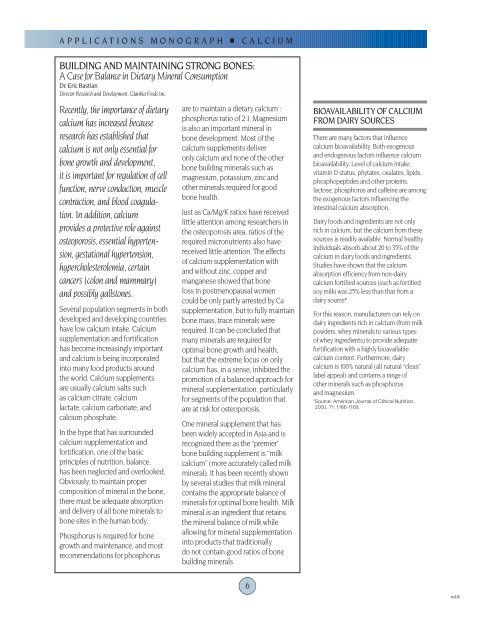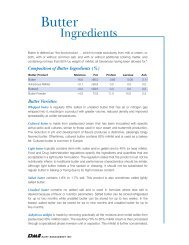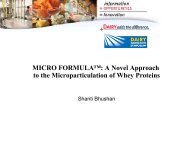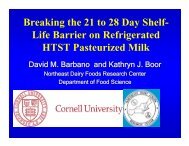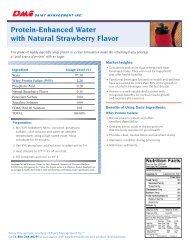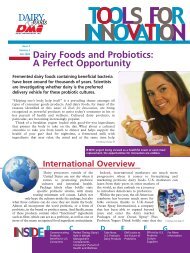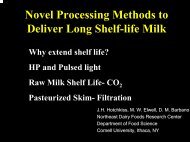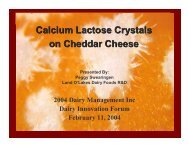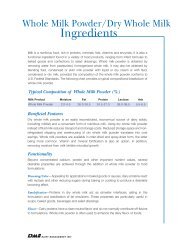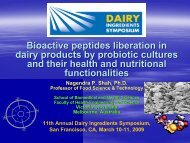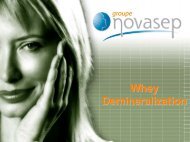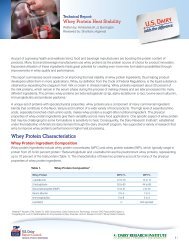Whey products, milk minerals and dairy calcium - InnovateWithDairy ...
Whey products, milk minerals and dairy calcium - InnovateWithDairy ...
Whey products, milk minerals and dairy calcium - InnovateWithDairy ...
Create successful ePaper yourself
Turn your PDF publications into a flip-book with our unique Google optimized e-Paper software.
APPLICATIONS MONOGRAPH ■ CALCIUMBUILDING AND MAINTAINING STRONG BONES:A Case for Balance in Dietary Mineral ConsumptionDr. Eric BastianDirector Research <strong>and</strong> Development, Glanbia Foods Inc.Recently, the importance of dietary<strong>calcium</strong> has increased becauseresearch has established that<strong>calcium</strong> is not only essential forbone growth <strong>and</strong> development,it is important for regulation of cellfunction, nerve conduction, musclecontraction, <strong>and</strong> blood coagulation.In addition, <strong>calcium</strong>provides a protective role againstosteoporosis, essential hypertension,gestational hypertension,hypercholesterolemia, certaincancers (colon <strong>and</strong> mammary)<strong>and</strong> possibly gallstones.Several population segments in bothdeveloped <strong>and</strong> developing countrieshave low <strong>calcium</strong> intake. Calciumsupplementation <strong>and</strong> fortificationhas become increasingly important<strong>and</strong> <strong>calcium</strong> is being incorporatedinto many food <strong>products</strong> aroundthe world. Calcium supplementsare usually <strong>calcium</strong> salts suchas <strong>calcium</strong> citrate, <strong>calcium</strong>lactate, <strong>calcium</strong> carbonate, <strong>and</strong><strong>calcium</strong> phosphate.In the hype that has surrounded<strong>calcium</strong> supplementation <strong>and</strong>fortification, one of the basicprinciples of nutrition, balance,has been neglected <strong>and</strong> overlooked.Obviously, to maintain propercomposition of mineral in the bone,there must be adequate absorption<strong>and</strong> delivery of all bone <strong>minerals</strong> tobone sites in the human body.Phosphorus is required for bonegrowth <strong>and</strong> maintenance, <strong>and</strong> mostrecommendations for phosphorusare to maintain a dietary <strong>calcium</strong> :phosphorus ratio of 2:1. Magnesiumis also an important mineral inbone development. Most of the<strong>calcium</strong> supplements deliveronly <strong>calcium</strong> <strong>and</strong> none of the otherbone building <strong>minerals</strong> such asmagnesium, potassium, zinc <strong>and</strong>other <strong>minerals</strong> required for goodbone health.Just as Ca/Mg/K ratios have receivedlittle attention among researchers inthe osteoporosis area, ratios of therequired micronutrients also havereceived little attention. The effectsof <strong>calcium</strong> supplementation with<strong>and</strong> without zinc, copper <strong>and</strong>manganese showed that boneloss in postmenopausal womencould be only partly arrested by Casupplementation, but to fully maintainbone mass, trace <strong>minerals</strong> wererequired. It can be concluded thatmany <strong>minerals</strong> are required foroptimal bone growth <strong>and</strong> health,but that the extreme focus on only<strong>calcium</strong> has, in a sense, inhibited thepromotion of a balanced approach formineral supplementation, particularlyfor segments of the population thatare at risk for osteoporosis.One mineral supplement that hasbeen widely accepted in Asia <strong>and</strong> isrecognized there as the “premier”bone building supplement is “<strong>milk</strong><strong>calcium</strong>” (more accurately called <strong>milk</strong>mineral). It has been recently shownby several studies that <strong>milk</strong> mineralcontains the appropriate balance of<strong>minerals</strong> for optimal bone health. Milkmineral is an ingredient that retainsthe mineral balance of <strong>milk</strong> whileallowing for mineral supplementationinto <strong>products</strong> that traditionallydo not contain good ratios of bonebuilding <strong>minerals</strong>.BIOAVAILABILITY OF CALCIUMFROM DAIRY SOURCESThere are many factors that influence<strong>calcium</strong> bioavailability. Both exogenous<strong>and</strong> endogenous factors influence <strong>calcium</strong>bioavailability. Level of <strong>calcium</strong> intake,vitamin D status, phytates, oxalates, lipids,phosphopeptides <strong>and</strong> other proteins,lactose, phosphorus <strong>and</strong> caffeine are amongthe exogenous factors influencing theintestinal <strong>calcium</strong> absorption.Dairy foods <strong>and</strong> ingredients are not onlyrich in <strong>calcium</strong>, but the <strong>calcium</strong> from thesesources is readily available. Normal healthyindividuals absorb about 20 to 35% of the<strong>calcium</strong> in <strong>dairy</strong> foods <strong>and</strong> ingredients.Studies have shown that the <strong>calcium</strong>absorption efficiency from non-<strong>dairy</strong><strong>calcium</strong> fortified sources (such as fortifiedsoy <strong>milk</strong>) was 25% less than that from a<strong>dairy</strong> source.*For this reason, manufacturers can rely on<strong>dairy</strong> ingredients rich in <strong>calcium</strong> (from <strong>milk</strong>powders, whey <strong>minerals</strong> to various typesof whey ingredients) to provide adequatefortification with a highly bioavailable<strong>calcium</strong> content. Furthermore, <strong>dairy</strong><strong>calcium</strong> is 100% natural (all natural “clean”label appeal) <strong>and</strong> contains a range ofother <strong>minerals</strong> such as phosphorus<strong>and</strong> magnesium.*Source: American Journal of Clinical Nutrition.2000. 71: 1166-1169.6eJ.6


